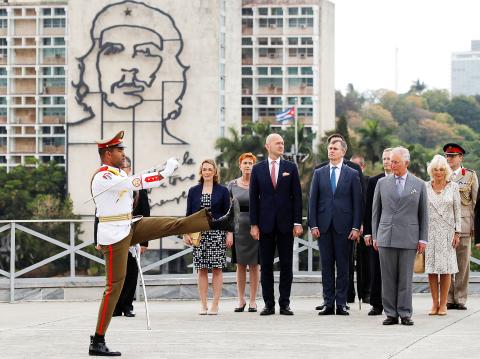Prince Charles and his wife, Camilla, on Sunday began the first official trip to Cuba by the British royal family, in a pomp-filled display of disagreement with the US administration’s strategy of economically isolating the communist island.
The heir to the British throne arrived in Havana and laid a wreath at the memorial to colonial independence hero Jose Marti, near massive portraits of socialist revolutionary icons, including guerrilla fighter Che Guevara.
The next two days included visits to historic sites, a solar park, organic farm and biomedical research center, and a meeting with entrepreneurs, cultural gala and dinner with Cuban President Miguel Diaz-Canel.

Photo: Reuters
It does not include visits with political dissidents or other critics of Cuba’s single-party system, a decision that has prompted criticism from Cuban exiles.
US Senator Rick Scott of Florida last month asked Prince Charles to cancel his trip given Cuba’s support for Venezuelan President Nicolas Maduro and the island’s “decades-long history of persecuting and imprisoning its defectors and repressing its people.”
US Senator Marco Rubio, another senator from Florida, also has long advocated for isolating Cuba and Venezuela, and the senators have found a receptive audience in US President Donald Trump’s administration, which has been tightening financial sanctions on both countries in the hopes of toppling their governments.
Trump has seen European and Latin American support for his Venezuela policy, but less backing on Cuba, whose government has already withstood a 60-year US embargo without showing any signs of losing its grip on power.
British Minister of State for Europe and the Americas Sir Alan Duncan wrote Scott last month that “like a number of other countries, we believe that the best way to promote human rights and encourage a Cuba that fully respects fundamental freedoms is through practical diplomacy, such as with this visit.”

Asian perspectives of the US have shifted from a country once perceived as a force of “moral legitimacy” to something akin to “a landlord seeking rent,” Singaporean Minister for Defence Ng Eng Hen (黃永宏) said on the sidelines of an international security meeting. Ng said in a round-table discussion at the Munich Security Conference in Germany that assumptions undertaken in the years after the end of World War II have fundamentally changed. One example is that from the time of former US president John F. Kennedy’s inaugural address more than 60 years ago, the image of the US was of a country

BLIND COST CUTTING: A DOGE push to lay off 2,000 energy department workers resulted in hundreds of staff at a nuclear security agency being fired — then ‘unfired’ US President Donald Trump’s administration has halted the firings of hundreds of federal employees who were tasked with working on the nation’s nuclear weapons programs, in an about-face that has left workers confused and experts cautioning that the Department of Government Efficiency’s (DOGE’s) blind cost cutting would put communities at risk. Three US officials who spoke to The Associated Press said up to 350 employees at the National Nuclear Security Administration (NNSA) were abruptly laid off late on Thursday, with some losing access to e-mail before they’d learned they were fired, only to try to enter their offices on Friday morning

STEADFAST DART: The six-week exercise, which involves about 10,000 troops from nine nations, focuses on rapid deployment scenarios and multidomain operations NATO is testing its ability to rapidly deploy across eastern Europe — without direct US assistance — as Washington shifts its approach toward European defense and the war in Ukraine. The six-week Steadfast Dart 2025 exercises across Bulgaria, Romania and Greece are taking place as Russia’s invasion of Ukraine approaches the three-year mark. They involve about 10,000 troops from nine nations and represent the largest NATO operation planned this year. The US absence from the exercises comes as European nations scramble to build greater military self-sufficiency over their concerns about the commitment of US President Donald Trump’s administration to common defense and

Cook Islands officials yesterday said they had discussed seabed minerals research with China as the small Pacific island mulls deep-sea mining of its waters. The self-governing country of 17,000 people — a former colony of close partner New Zealand — has licensed three companies to explore the seabed for nodules rich in metals such as nickel and cobalt, which are used in electric vehicle (EV) batteries. Despite issuing the five-year exploration licenses in 2022, the Cook Islands government said it would not decide whether to harvest the potato-sized nodules until it has assessed environmental and other impacts. Cook Islands Prime Minister Mark Brown